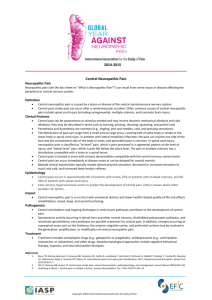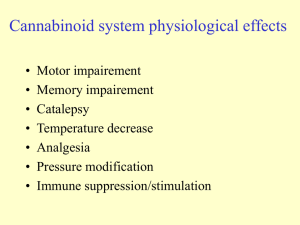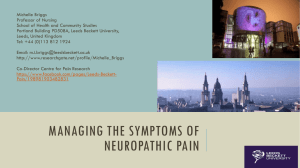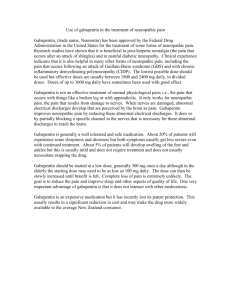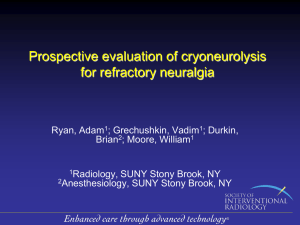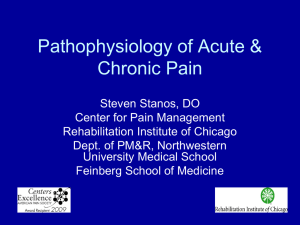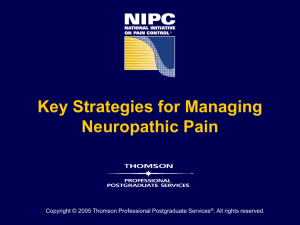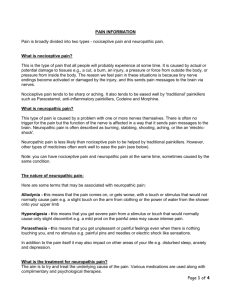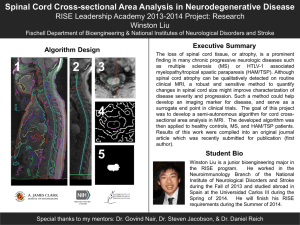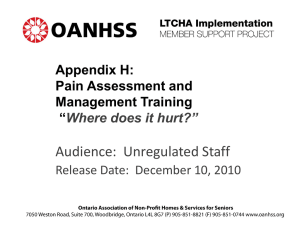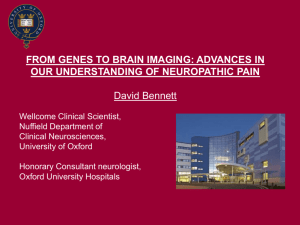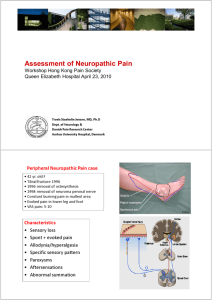Neuropathic Pain - Medical Council of Guyana
advertisement
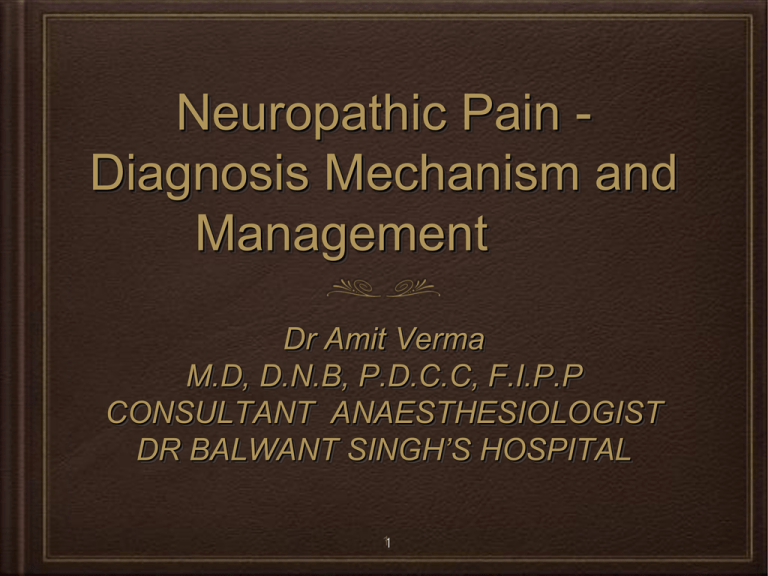
Neuropathic Pain Diagnosis Mechanism and Management Dr Amit Verma M.D, D.N.B, P.D.C.C, F.I.P.P CONSULTANT ANAESTHESIOLOGIST DR BALWANT SINGH’S HOSPITAL 1 2 CASE 1 • 55 yr. , Female • Presented with pain in back of chest for 5 yrs • No h/o HZ, DM, Trauma, Loss of weight • Quality - burning • Intensity 5 - 6 / 10 • Tried NSAIDs multiple times 3 CASE 2 • 75 yrs, Female • Feels Depressed due to Pain in chest • Severe lancinating pain with increased sensitivity • H/O very painful rash in the same distribution 5 months back • Rash subsided but pain didnt 4 CASE 3 • 35 yr., female patient with severe headache. • Diagnosed as a case of migraine • • Wincing in pain , ℅ jolts of pain while combing her hair On Migraine prophylaxis 5 CASE 4 • • 45 yr. Old Male on a hot summer day with a wool shawl draped around his shoulder and right arm ℅ Pain in the right hand following closed reduction of wrist fracture • Right arm was cold and sometimes sweaty • Severe pain on cutting nail • Visited three physician who referred her to a psychiatrist with the diagnosis of Conversion disorder 6 Pain Poena - penalty / punishment Start of Pain Clinics Insight into the Etiopathogenesis Fifth vital Sign 2 Classification ( IASP) Region System Acute Vs Chronic Mild / Moderate / Severe Nociceptive / Inflammatory/ Neuropathic ( Clifford J Woolf ) 3 Definition IASP defines Pain as an unpleasant sensory or emotional experience which we primarily associate with tissue damage or describe in terms of such damage , or both Neuropathic Pain as Pain initiated or caused by a primary lesion or dysfunction of the peripheral or central nervous system 4 Neuropathic Pain - Difficulties No Consensus on Definition Pain Perception is subjective Rarely One Diagnostic Test Lack Of Specificity in Diagnosis Signs & Symptoms Change Over Time Patients not believed 5 Components of Neuropathic Pain Pain Lancinating/burning/pricking/stabbing No ongoing tissue damage Delay in onset after nerve injury Spontaneous paroxysmal electric shock sensation 13 Abnormal Sensations PAINFUL STIMULUS Low Intensity Stimulation Innocuous sensation INCREASED PAIN PAIN ALLODYNIA HYPERALGESIA 12 Negative sensory signs Pain with numbness Presence of neurologic deficit 14 Descriptions of Neuropathic Pain “I feel as though someone has pulled the skin off my left arm and is then constantly rubbing salt into the wound.” “I feel as though my leg is on fire. My skin feels burnt, and it is as though someone is taking a claw and tearing into my skin 24 hours a day.” “I feel as though someone has taken a hot poker knife and is jabbing it deep into my right eye. If I could pull my eye out, only to remove the sensation, I would gladly do so.” 15 Neuropathic Pain Syndromes 1. Peripheral Nervous System ( focal and multifocal lesions ) 2. Peripheral Nervous System ( Generalized polyneuropathies ) 3. Central Nervous System Lesions 4. Complex Neuropathic Disorders 15 Peripheral Nervous System (focal and multifocal lesions) Trigeminal neuralgia Post herpetic neuralgia Diabetic Mono neuropathy Entrapment Syndrome Ischemic Neuropathy Phantom Limb Post Traumatic Neuralgia 7 Peripheral Nervous System Generalized Polyneuropathies Metabolic - DM, Amyloid Toxic - Alcohol, taxanes Infective - HIV Autoimmune - GBS Hereditary - Fabry’s Disease Malignancy 8 Central Nervous System Lesions Spinal Cord Injury Prolapsed Disc Stroke Multiple Sclerosis Parkinson’s Disease Surgical Lesions 9 Complex Neuropathic Disorders Complex Regional Pain Syndrome I Complex Regional Pain Syndrome II 10 MECHANISM OF NEUROPATHIC PAIN 16 22 Ascending Pain Pathway 17 Descending Pain Pathway 18 Cerebral Reorganization Molecular Changes Brain Spinal Cord Spinal Cord anatomical reorganization Dorsal Horn Denervation Sensitivity Molecular Changes Peripheral nerve fibers Sympathetic Fibers •Ectopic Discharge •Collateral Sprouting •Nociceptive sensitization Ephaptic Crosstalk 19 Ectopic Discharges • Increase in the level of spontaneous firing in the injured neurons as well as their uninjured neighbor neuron • Result of alteration in the expression of Sodium channels 26 Ephaptic Conduction • Cross excitation among the neurons having spontaneous firing capacity leading to amplification of depolarization • Important in association of Sympathetic system 27 Collateral Sprouting • Primary afferent neuron injury leads to sprouting of collateral fibers from sensory axon in their attempt to regenerate • These sprouts are sensitive to low threshold stimulus 28 SNS AND PNS COUPLING • DUE TO ENHANCED SENSITIVITY TO CATECHOLAMINES LEADING TO PAIN PERCEPTION 29 Nociceptive Sensitization • Increase in Bradykinin binding sites within DRG following axotomy leading hyperalgesia 30 Central & Spinal Cord 20 CENTRAL MECHANIMS • Spinal Cord reorganization • Spinal Cord hyper excitability ( central sensitization ) • Cerebral Reorganization 32 DIAGNOSIS OF NEUROPATHIC PAIN 21 34 Healing begins with the History Clinical description and history taking are the best mechanism to diagnose Neuropathic Pain Identify All matching neuroanatomical or dermatomal pattern Painful symptom Altered sensation History 22 Screening Methods Leeds Assessment of Neuropathic Symptoms and Signs ( LANSS ) scale Sens / Spec - 83 / 87 % Pain DETECT questionnaire Neuropathic Pain Questionaire Neuropathic Pain Scale 23 24 Bedside Examination Identify the altered sensation in painful area ( compare with non painful area ) Dysesthesia (Allodynia, Hypoalgesia, Hyperalgesia ) Inability to distinguish warm and cold objects 25 Pain & Functional Brain Imaging ( F.B.I ) Positron Emission Tomography Functional MRI Both Measure energy consumption in activated brain regions FBI has mapped the brain neuromatrix ( area of brain that processes pain response ) 26 Functional Brain Imaging • Neuromatrix • 1o & 20 somatosensory cortex ( mediate sensory discriminative features of pain ) • • Anterior cingulate gyrus cortex and insula ( mediate affective motivational component of pain • Pre frontal cortex - mediate cognitive aspects of pain • Thalamus - gateway between cortex and brainstem Increased regional blood flow of neuromatrix in Neuropathic 40 Pain 41 Approach To Treatment DIAGNOSIS TREAT UNDERLYING CONDITION REDUCE PAIN IMPROVE PHYSICAL FUNCTION PREVENTION REDUCE PSYCHOLOGICAL DISTRESS 42 IMPROVE QUALITY OF LIFE Management Mx of ectopic activity / Ephaptic Conduction Na+ Channel Blockers - Phenytoin Lignocaine Oxcarbazepine Gabapentin 33 Reducing Central Sensitization NMDA receptor antagonist Ketamine Amitryptyline Methadone Gabapentin, Pregabalin 34 Improving Descending Control Local Inhibitory controls GABA - B agonist - Baclofen Opioids - Oxycodone, tramadol Descending inhibition form brain Clonidine TCA 35 Sympathetically Mediated Pain Sympathetic Plexus Block Stellate ganglion Lumbar Sympathetic chain block Central Neuraxial Block Epidural infusions of adjuvants and local anesthetics Intrathecal infusions - opioids / baclofen 36 Somatic / Sensory Nerve Block Brachial Plexus Block Para - vertebral Block Lateral Cutaneous Nerve of Thigh Block Intercostal Nerve Block 37 48 Interventional Strategies Diagnostic Break in cycle of Pain Should be Imm. Followed by active physiotherapy Epidural, Trans Foraminal , Facet Blocks Spinal Cord Stimulation 38 Complementary Therapies Acupuncture Nutritional Counseling Massage Therapy Mirror Therapy 39 Pharmacotherapy • Carbamazepine • • • Dose – 100 mg BD - 1000 mg / day S/I – Dizziness, Ataxia, N/V, S.J Syndrome, TCP C/I – Liver Dysfunction, B.M suppresion 40 Gabapentin • Multi modal action - Reduces ectopic activity, dampens central sensitization and decreases glutamate activity • Dose – 300 – 3000 mg / day • S/I – dizziness, sedation, weight gain • C/I - Hypersensitivity 41 Pregabalin • • • Dose – 75 – 600 mg / day in divided doses S/E – Dizziness, sedation, confusion, peripheral edema C/I - Hypersensitivity 42 TCA - Amitriptyline • • • Dose – 10 – 75 mg / day in EDD S/E – anticholinergic, constipation, confusion C/I – narrow angle glaucoma, urinary retention, 2nd or 3rd degree heart block 43 Ketamine • • • Dose – 0.25 mg / kg – 1000mg/day S/I - delirium, hallucinations, confusion, night mares C/I – hypersensitivity, psychiatiric disorders 44 56 Lignocaine • Dose – 5 mg/kg over 1 hour • S/E- hypotension, Neurotoxicity, sedation • Effective diagnostic tool to identify responsiveness to Na channel blockers 45 Tramadol • Dose – 50mg bd – 400 mg /day • S/I – sedation , Nausea • C/I- hypersensitivity, drowsy , elderly 46 CASE 1 • 55 yr. , Female • Presented with pain in back of chest for 5 yrs • No h/o HZ, DM, Trauma, Loss of weight • Quality - burning • Intensity 5 - 6 / 10 • Tried NSAIDs multiple times 59 CASE 2 • 75 yrs, Female • Feels Depressed due to Pain in chest • H/O very painful rash in the same distribution 5 months back • Rash subsided but pain didnt 60 CASE 3 • 35 yr., female patient with severe headache. • Diagnosed as a case of migraine • • Wincing in pain , ℅ jolts of pain while talking, combing her hair On Migraine prophylaxis 61 CASE 4 • • 45 yr. Old Male on a hot summer day with a wool shawl draped around his shoulder and right arm ℅ Pain in the right hand following closed reduction of wrist fracture • Right arm was cold and sometimes sweaty • Severe pain on cutting nail • Visited three physician who referred her to a psychiatrist with the diagnosis of Conversion disorder 62 63 64 65 Conclusion Neuropathic pain is a neuropsychiatric condition in which pain is initiated or caused by a primary lesion or dysfunction in the nervous system. Understanding the complexity of neuropathic pain becomes the cornerstone for appropriate diagnosis and management. Successful management depends on realistic patient-physician expectations and an individualized, multidisciplinary approach that takes advantage of the ever-evolving armamentarium of evidenced- based treatments. 49 Thank You • We must all die. But that I can save him from days of torture, that is what I feel as my great and ever new privilege. Pain is a more terrible lord of mankind than even death itself • Albert Schweitzer 50
